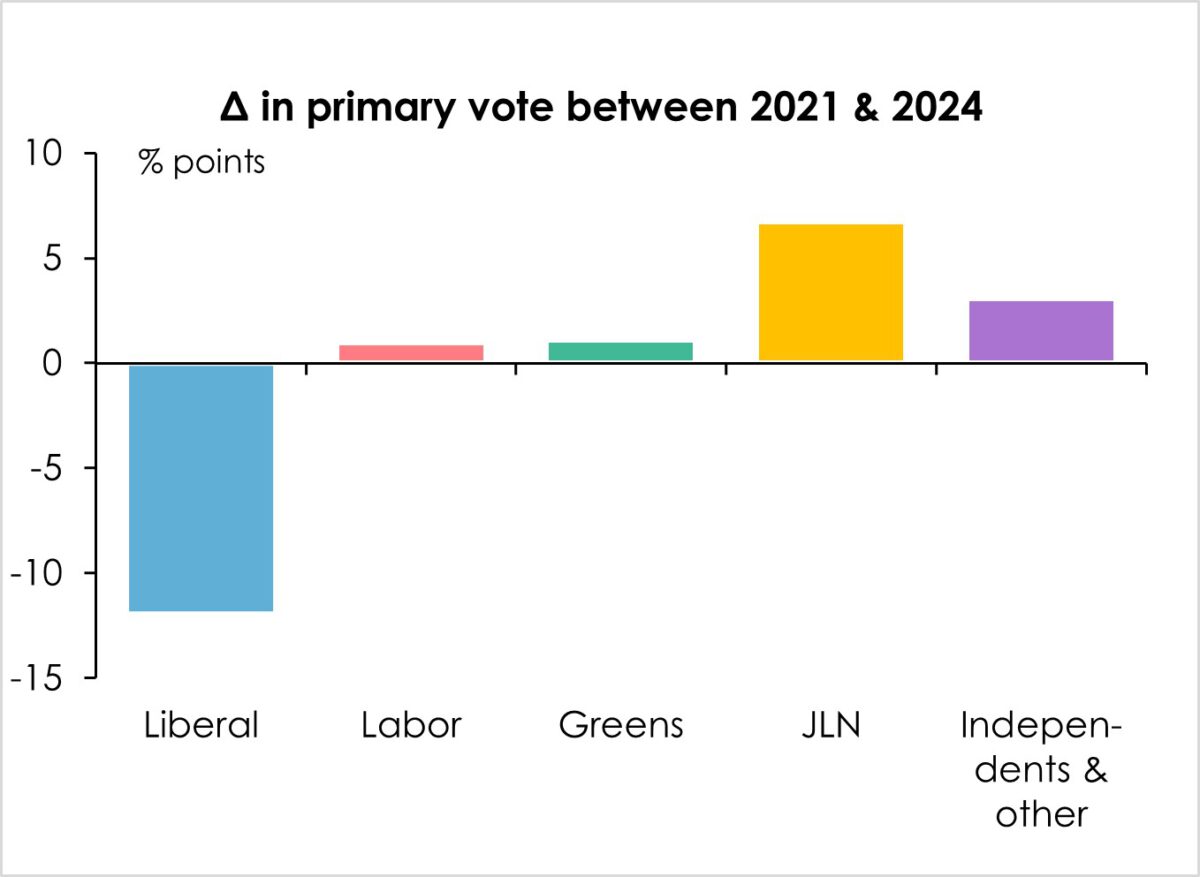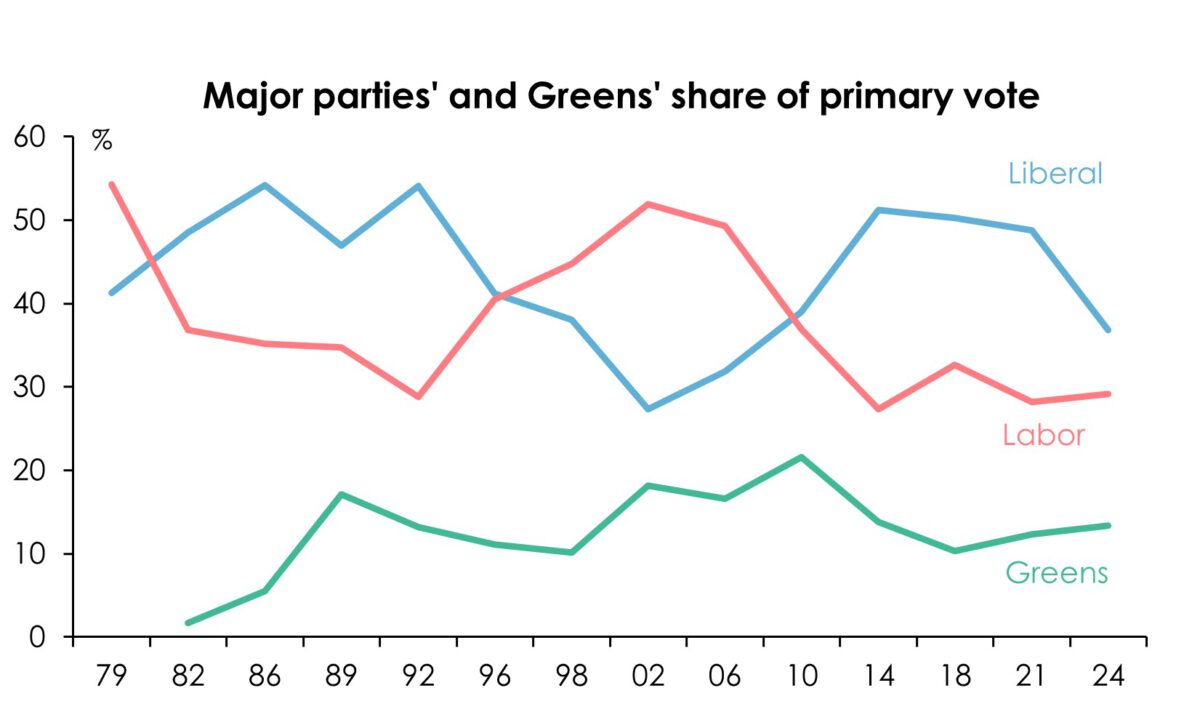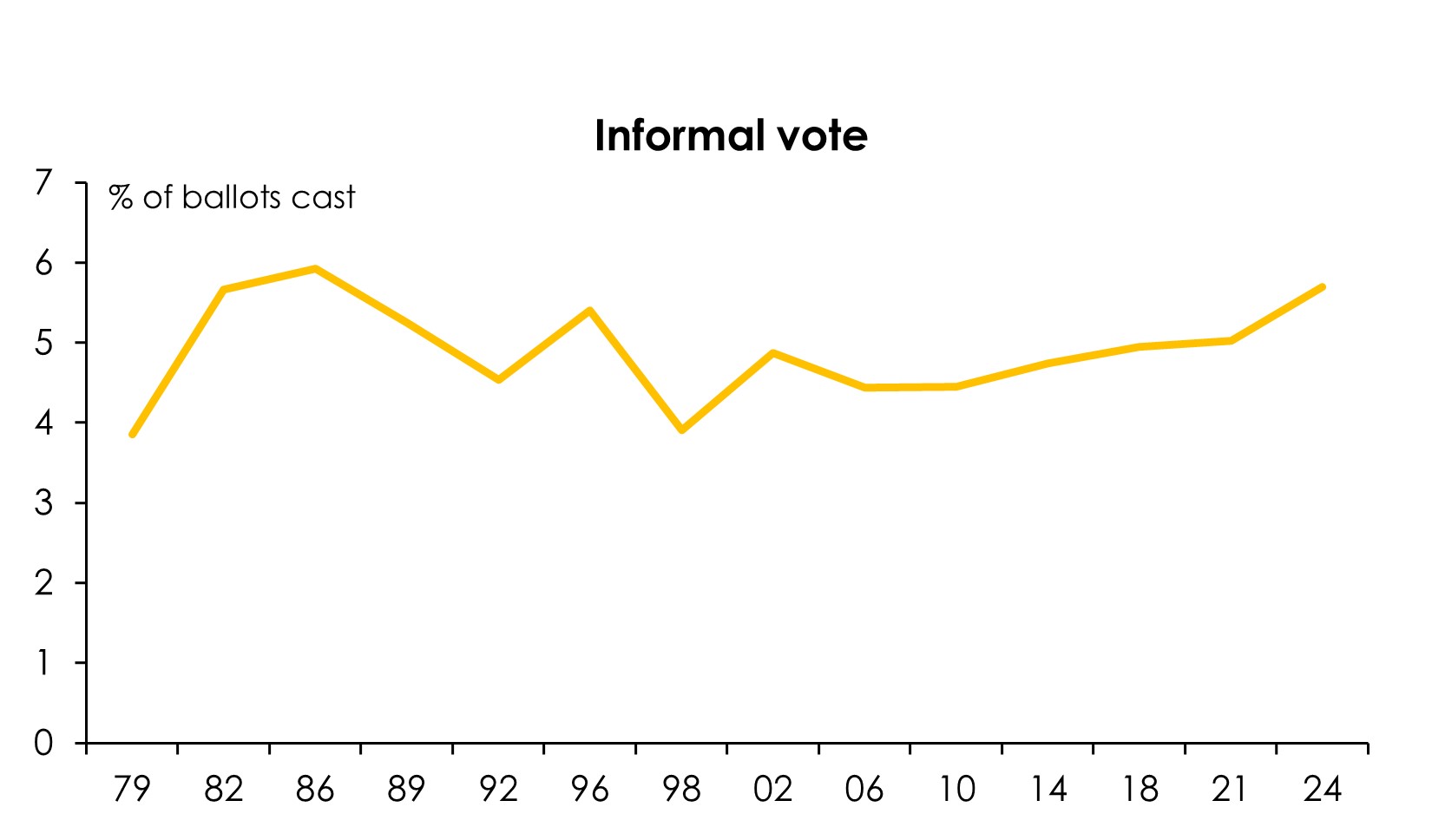Some initial reflections on the outcome of the 2024 Tasmanian State election
Australian Society and Politics, Tasmania | 24th March 2024
Some initial reflections on the Tasmanian election results
(based on figures posted on the Tasmanian Electoral Commission website as of 9am Sunday morning, 24th March).
First, the Liberals were the biggest losers at the election. Their share of the primary vote fell by 12.0 pc pts, the second-largest swing against them ever recorded (exceeded only by the 12.9% swing in 1996), to 36.9%, the lowest since 2006, and their third lowest ever since World War II. They did particularly badly in Bass, where their share of the vote fell by 22 pc pts (reflecting the loss of Peter Gutwein’s huge personal vote in 2021). That said, they have still ended up with more seats than any other party, and (at this stage) seem more likely to form a minority government than anyone else.
Change in primary vote between 2021 and 2024 elections

Source: Tasmanian Electoral Commission.
Major parties’ and Greens’ share of primary vote at elections 1972-2024

Source: Tasmanian Electoral Commission.
Second, in that context, it was a very bad result for Labor. Their primary vote only increased by 1.0 pc pt (in contrast to the 11.6 pc pt swing they achieved at the aforementioned 1996 election), to 29.2%, their third-lowest vote in the past 115 years.
Labor conspicuously failed to make any mention during the campaign of the deteriorating performance of and outlook for the Tasmanian economy, or the growing population exodus, and made almost no mention of the deterioration in Tasmania’s public finances. They were badly let down, in these areas, by their Treasury and Finance spokespeople.
Third, the 66.0% share of the primary vote for the two major parties was the lowest ever recorded, down 11 pc points from 2021 and 16.8 pc pts from 2018.
Fourth, the Greens didn’t gain much in terms of votes from this swing against the major parties. Their share of the primary vote rose by only 1.1 pc pt, and at 13.4% was less than they got in 2014 (13.8%) or at the 1989, 2002, 2006 and 2010 elections. But because of the reduction in quotas as a result of the return to a 35-seat House of Assembly, they will likely end up with two and possibly three more seats, ie 4 or 5.
Fifth, the Jacqui Lambie Network picked up 6.8% of the vote (ie, more than half the share of the vote which the Liberals lost). It would probably have been higher but for the higher-than-usual informal vote (see below), which was greater in the electorates in which JLN did best.
They are almost certain to win a seat in Braddon, and could get one in either or both of Bass and Lyons – although unlike the major parties and the Greens it isn’t at all clear which of their candidates will be elected, since the votes are remarkably evenly distributed across the three candidates in each of the four electorates which they contested. To a much greater extent than for the major parties or the Greens, the votes for the JLN were votes for a party, rather than for a candidate.
Sixth, other independents and minor parties didn’t do as well as had been foreshadowed by opinion polls (although again this may have been influenced at the margin by the higher-than-usual informal vote). There will be at most two Independents in the next Parliament (Kristie Johnston in Clark and, perhaps, David O’Byrne in Franklin). In particular Sue Hickey fared much less well in Clark than she would have hoped for. As in 2021, she should have run in Franklin.
Seventh, the informal vote of 5.6% was the highest since 1986. It was 6.1% in Braddon and 6.5% in Lyons. It seems likely that some people voting for minor parties or independents for the first time didn’t realize they needed to vote for at least 7 candidates for their votes to be formal – despite the Electoral Commission’s efforts to make that clear.
Informal vote at elections 1972-2024

Source: Tasmanian Electoral Commission.
Finally, the two independents whose defection from the Liberals both lost badly, John Tucker getting just 3.3% in Lyons and Lara Alexander 2.3% in Bass. Their defections were not prompted by concerns over the cost of Marinus Link or the Mac Point Stadium, but rather over Jeremy Rockliff’s support for the ‘Yes’ campaign in the Voice referendum, and the Government’s proposed anti-conversion therapy legislation (plus, in Tucker’s case, his failure to be appointed as Minister for Primary Industry). Good riddance!
It will now take some time for the outcome of the election to be finalized. The Tasmanian Electoral Commission won’t begin distributing the ‘surpluses’ of those candidates who have gained more than a ‘quota’ (12½%) of primary votes, and then distributing the preferences of the candidates with the lowest votes, until Tuesday 2nd April. That process will inevitably take some days. In the meantime, both major parties are likely to initiate negotiations with prospective minor party and independent members of the new Parliament, with a view to being able to persuade the Governor that they can form a government which can in turn be assured of confidence and supply. As the incumbent Premier it will be up to Jeremy Rockliff to advise the Governor whether he can do that, or whether she should invite Rebecca White to do so. It may therefore be some weeks before Tasmanians know the composition of their next State Government.
Whoever that Government is will have a difficult task preparing the 2024-25 State Budget.